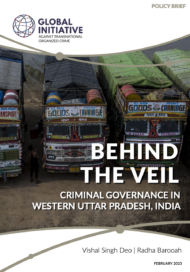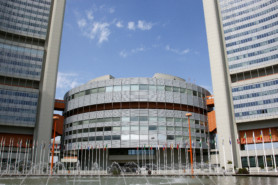Posted on 19 Jun 2015
The Norwegian government launched a new white paper on global security challenges in Norway’s foreign policy, which includes efforts to strengthen information and analysis capacity against the rapidly rising threat of organised crime in supporting terrorism, cyber crime and even state conflicts, working across fields of Defence, Police, Justice and development at a new scale. This is intended to ensure a more effective and more coherent effort to address global security challenges.
At a joint launch event today with INTERPOL Secretary-General and Global Initiative founding member Jurgen Stock, Minister of Foreign Affairs Børge Brende has announced that against this strategic framework, Norway will allocate NOK 200 million (US$25.6 million) annually to the fight against terrorism, organised crime, piracy and cyber threats. This will be divided into two development programmes: one to support efforts to combat serious and organised crime and one to combat and prevent violent extremism and terrorism.
‘Norway is facing growing and more complex security challenges, such as more frequent and more advanced cyber attacks, an increased terror threat level, and criminal networks that are financing militias and terrorist groups. These challenges are occurring at the same time and they are occurring globally. Our response must also be global, using instruments from development policy, foreign policy, justice policy and defence policy,’ said Minister of Foreign Affairs Børge Brende.
The global security landscape has changed fundamentally in the past few years. To an increasing extent, we are seeing that non-traditional security threats and certain non-state actors are having an impact on the situation in Norway and globally.
The Government attaches importance to using development policy instruments to promote stability and prevent radicalisation, violent extremism, organised crime, piracy, cyber threats and conflict. The Government also intends to use this vehicle to enhance the exchange of information and cooperation between Norwegian ministries, agencies and other actors working in these fields. Two new forums for cooperation will be established to this end, and private sector actors, civil society organisations and academic and research groups will also participate in these forums with a view to contributing their knowledge and expertise.
‘Norway’s security is now more directly affected by developments in other countries and other parts of the world than it was in the past. Problems of governance and development in fragile states affected by violent conflict are increasingly becoming our own security concerns,’ said Mr Brende.
‘The new security strategy represents a leap forward in the ability to intervene or prevent threats in much earlier stages of development against security and development,’ said Global Initiative Network Member, Christian Nellemann, of the RHIPTO-Norgian Center for Global Analysis. It essentially pioneers the recent request from Resolution S2195 from the UN Security Council to strengthen the analytical capacity of member states to address this threat, and makes Norway a serious player in innovating integrated approaches in the global arena in response to multi-dimensional security threats.
The paper is available for download in English at this link.



